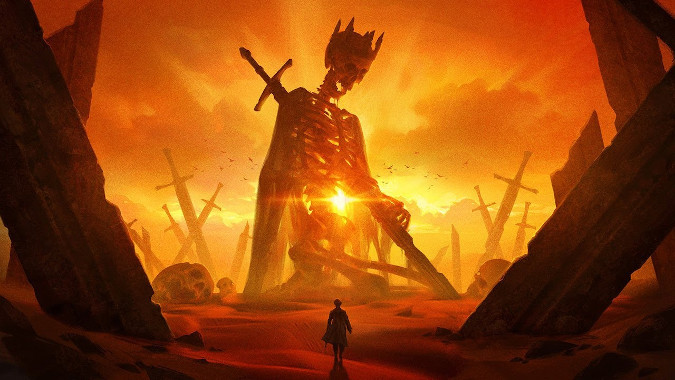Hasbro continues to push AI content that no one asked for into Dungeons & Dragons in ongoing quest to ruin beloved TTRPG

During a September 10 Goldman-Sachs conference, where one can undoubtedly find serious players of interactive tabletop roleplaying games, Hasbro President Chris Cocks revealed AI is actively being used to develop games at the company, including Magic: The Gathering and Dungeons & Dragons:
“Inside of development, we’ve already been using AI…It’s mostly machine-learning-based AI or proprietary AI as opposed to a ChatGPT approach. We will deploy it significantly and liberally internally as both a knowledge worker aid and as a development aid.”
This revelation was in response to a question regarding AI’s potential to bring down production costs. What constitutes production costs? Likely the salaries of narrative and encounter designers, artists, and other staff who contribute to the meaningful creation these games.
None of this is particularly surprising because over the last 18 months, Hasbro subsidiary Wizards of the Coast has been the subject of continuous AI scrutiny when it was discovered that AI-generated art was used for Magic: The Gathering promotional material. After denying the art was AI-generated, the company apologized for using AI art and vowed not to do it again, before doing it again, and then hiring a generative AI engineer for future projects, bringing us full circle.
Plenty of CEOs, tech and otherwise, have been enamored by the ever-jingling set of keys that is generative AI. But Cocks isn’t drawn by to what generative AI can do: he seems more interested in what he thinks AI should do:
“The themes around using AI to enable user-generated content, using AI to streamline new player introduction, using AI for emergent storytelling — I think you’re going to see that not just our hardcore brands like D&D but also multiple of our brands.”
The catalyst, Cocks prefaces, is that he routinely plays TTRPGs with “30-40 other people” at a time and all of them use AI, which means everyone should be using it. (This statement reeks of “How do you do, fellow kids?” to anyone who’s actually tried to schedule tabletop games with friends, a hopeless task of juggling schedules and last-minute cancelations just to be able to play one game a month.) Instead of utilizing AI for something useful, like developing and expanding accessibility systems all players can use, this idea perpetuates the two-pronged problem of generative-AI content.
The first has been covered ad nauseam — you need to train the system with large data set, which usually involves stealing other people’s work. (And yes, this can include when a company owns the IP, because people created this content and are not paid for its use, though this topic takes a tangent into how workers are compensated and sometimes-exploitive work for hire contracts.) The second is the closed loop of generative content: when an AI is trained on a library of similar content (say fifty years of Dungeons & Dragons adventures), anything it creates can be predictable and stale. Generative AI remixes whatever content it’s fed; it can’t create new content, and at some point that will become obvious in anything it produces.
The greatest thing about the human mind happens to also be the core of all TTRPGs, and that is spur of the moment innovation and improvisation. You can be anyone, you can do anything, you can go anywhere. Game masters can plan as much as they want, one of their players will circumvent even the most carefully laid plans in completely unanticipated ways, forcing adaptation in the moment. A large part of the experience of playing TTRPGs — as both GM and player — is experiencing the situation and navigating through it together. How will the players react and plan their next move while the GM gleefully attempts to TPK them? How can a GM continuously provide settings and challenges their players can connect and immerse themselves in?
While AI can be good at some things, original storytelling isn’t one of those things — and overuse of AI could lead us to an endless series of bland, predictable adventures. But not all games are going that way.
For TTRPG players looking for modules to play that don’t completely abandon the spirit of the game, other games companies have come out with staunch anti-AI content pledges in their current and future products. These include Chaosium, the developers of Call of Cthulhu, and Kobold Press, the developers of Tales of the Valiant and Midgard. For those who think pledges are just virtue-signal nonsense, consider which side you’d rather support as a player — the side that is committed to supporting actively human-based content to bring you new experiences or the side that’s taking you for a sucker by selling you the same stories, remixed, over and over?
The best aspect of any TTRPG is the human aspect, from GM to player to writer to artist. Speaking as a GM, I can effectively, mercilessly, and gleefully TPK a dungeon party of CEOs in a one-shot session driven by my imagination and using only paper and pencils, something AI lacks the creativity and spine to do (likely from an embedded rule to never hurt the CEOs’ feelings with reality).
When I put it that way, it’s probably why the CEOs would rather play with AI.
Please consider supporting our Patreon!
Join the Discussion
Blizzard Watch is a safe space for all readers. By leaving comments on this site you agree to follow our commenting and community guidelines.




